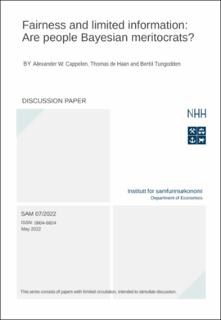| dc.contributor.author | Cappelen, Alexander W. | |
| dc.contributor.author | Haan, Thomas de | |
| dc.contributor.author | Tungodden, Bertil | |
| dc.date.accessioned | 2022-06-07T10:32:20Z | |
| dc.date.available | 2022-06-07T10:32:20Z | |
| dc.date.issued | 2022-05 | |
| dc.identifier.issn | 0804-6824 | |
| dc.identifier.uri | https://hdl.handle.net/11250/2997661 | |
| dc.description.abstract | Meritocracy is a prominent fairness view in many societies, but often difficult to apply because there is limited information about the source of inequality. This paper studies theoretically and empirically how limited information affects inequality acceptance. We connect the literatures on fairness and belief updating and show that irrationality in belief updating is potentially as important as differences in fairness views in explaining inequality acceptance. In many economic environments with limited information, signal-neglecting meritocrats act as egalitarians and base-rate neglecting meritocrats act as libertarians. The findings contribute to better understanding of the foundations of inequality acceptance in society. | en_US |
| dc.language.iso | eng | en_US |
| dc.relation.ispartofseries | SAM DP;07/2022 | |
| dc.title | Fairness and limited information: Are people Bayesian meritocrats? | en_US |
| dc.type | Working paper | en_US |
| dc.relation.project | Norges Forskningsråd: 262675 | en_US |
